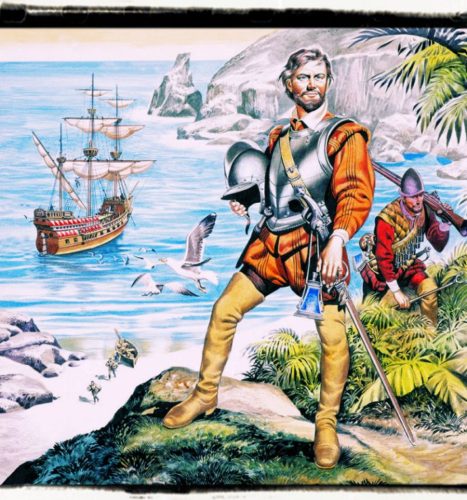
England expects that every man will do his duty.
Horatio Nelson
Time is everything; five minutes make the difference between victory and defeat.
Horatio Nelson
A fleet of British ships at war are the best negotiators.
Horatio Nelson
In Sea affairs, nothing is impossible, and nothing is improbable.
Horatio Nelson
There must be a beginning of any great matter, but the continuing unto the end until it be thoroughly finished yields the true glory.
Francis Drake
As everybody knows, the British are proud of their naval heritage. This partly springs from the island mentality, but it is also a consequence of a nostalgia for a more glorious past. In the comparative gloom of the twentieth century it is sometimes pleasant to remember such heroes as Sir Francis Drake and Horatio Nelson. The British love of things maritime is also reflected in the language. So commonplaces are nautical expressions in English that many people use them without having the faintest idea of their origins.
On one of the numerous cold days in England you may hear someone use, albeit gingerly, the expression, “brass monkey weather.” The reason why people use this rather than the full expression, “it’s cold enough to freeze the balls off a brass monkey” is because they are afraid of saying something naughty”. In fact the phrase shouldn’t be offensive. A brass monkey is not a primate but a tray for holding cannon balls, or at least it was in Nelson’s day. In extremely cold weather the brass monkey and its iron cannon balls both contracted but (I’m sure you don’t need to be reminded) brass and iron have different co-efficients of expansion. The result of this fact of life is that the cannon balls would occasionally fall off. When this happened the weather was declared cold enough to freeze the balls off a brass monkey.
It is no secret that the English are extremely fond of animals, often at the expense of their fellow human beings. Less well known is the fact that the English pride themselves on their discretion and have their own particular laws of omertà. Anyone who gets a friend into trouble by failing to keep a secret is considered an absolute rotter. If you take a day off work while pretending to be ill, it is naturally assumed that your colleagues will cover up for you. Should a colleague dare to tell the truth to the boss, then it is said that this unpleasant individual has “let the cat out of the bag.”

This might suggest that the English have a custom of keeping their pet cats in plastic bags. This isn’t the case, as far as I know: the cat in question is not a furry feline, but a whip. “The cat-o’-nine-tails” was a nasty instrument with nine knotted lashes and was used for flogging insubordinate sailors in days of old. Anyone who was fool enough to let the cat out of the bag and condemn a fellow mariner to this bloody form of punishment was liable to be unpopular.
The flagellation session required a certain amount of space: the cat was a large instrument and most of the crew would come and spectate. On small boats there wasn’t “enough room to swing a cat” and this expression also found its way onto the mainland. In both cases the expression – Between the devil and the deep blue sea – would indicate the difficult situation in which a poor fellow would have found himself, regardless of whether he was at sea or on the ground.
The British obsession with class is revealed in that eminently untranslatable word “posh”. Someone who “talks posh” has a well-to-do upper-middle class accent which will either impress or nauseate anyone who doesn’t. In Britain the posh accent is also the accent of leadership and many people have acquired one on their way to the top. The last two leaders of the Conservative Party, Edward Heath and Margaret Thatcher, both have posh accents in spite of having grocer parents.
The origins of the word posh are maritime. In the days of the Raj colonialists would go to India by sea. This was a long voyage which would take them through the Mediterranean, down the Suez Canal, the Red Sea and then into the Indian Ocean. On the outward journey the more expensive berths were on the port side and on the homeward journey they were on the starboard side. This was so that the first class travellers could avoid being exposed to the sun: in those halcyon days a sun tan was considered rather infra.dig. (this is the abbreviation of – infra dignitatem -, a latin expression that means – below what you consider to be socially acceptable – in the old days it was also an adjective, infra dig, but nowadays it is clearly old-fashioned) The first class tickets were nicknamed “Port Out, Starboard Home” and this was abbreviated to “P . O. S . H . ” It was later in the twentieth century that posh became a generic term for describing the antics of the type of people who travel first class.
Anyway keep always in mind that many phrases that have been adopted into everyday use originate from seafaring – in particular from the days of sail. Virtually all of these are metaphorical and the original nautical meanings are now forgotten. That association of travel and metaphor is significant in that the word metaphor derives from ancient Greek for ‘to carry’ or ‘to travel’. The influence of other languages and other cultures is evident in many of the long list of English phrases that have nautical origins.

It is an undoubted fact that seafaring is also the source of more false etymology than any other sphere. This can be attributed to the attractiveness of the romantic image of horny-handed sailors singing shanties and living a hearty and rough life at sea. To quote just another example, we can look at the acronym CANOE, the Committee to Ascribe a Naval Origin to Everything, which doesn’t really exist, but the number of these folk myths makes it seem as though they do..
It is lucky for us, in our endeavours to distinguish truth from falsehood, that activities at sea have been scrupulously recorded over the centuries, in insurance records, newspaper accounts and, not least, in ships log books. The term log-book has an interesting derivation in itself. An early form of measuring a ship progress was by casting overboard a wooden board (the log) with a string attached. The rate at which the string was payed out as the ship moved away from the stationary log was measured by counting how long it took between knots in the string. These measurements were later transcribed into a book. Hence we get the term ‘log-book’ and also the name ‘knot’ as the unit of speed at sea.
But the list of maritime expressions is endless. Next time you fly to England you might try using one or two of them as a token of respect for the nation’s naval history. I would, however, advise a degree of caution with “brass monkey weather” as you might find yourself sailing a little close to the wind or perhaps to the Jolly Roger, which is the traditional English name for the flag flown to identify a pirate ship about to attack, during the early 18th century, the later part of the Golden Age of Piracy, symbolized by a skull and crossbones on a black backcloth. It was used during the 1710s by a number of pirate captains including Black Sam Bellamy, Edward England, and John Taylor. It went on to become the most commonly used pirate flag during the 1720s, although other designs were also in use. It is sometimes claimed that the term derives from “Joli Rouge” (“Pretty Red”) in reference to a red flag used by French privateers. This is sometimes attributed to red blood, symbolizing violent pirates, ready to kill.

